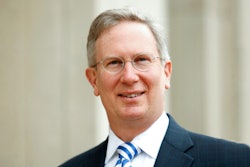BALTIMORE ― Uncertainty surrounds the status of professor Leopold Munyakazi, who briefly taught French at Goucher College and was deported to Rwanda under international charges of genocide.
His attorney in Northern Virginia, Ofelia Calderon, doesn’t know where he is being held and whether he has an attorney or trial date.
“If there are not public eyes, then he’ll disappear like so many,” she said. “I doubt in a pleasant manner.”
Officials at the Rwandan embassy in Washington did not answer questions about Munyakazi, 67, who is accused of stoking ethnic violence in the genocide of 1994.
The paunchy, bespectacled linguist had sought asylum in the U.S. and challenged the deportation ruling against him for nearly a decade. He exhausted his last appeal to return to his family in Baltimore County and was deported Sept. 28, well after he was suspended from teaching at Goucher.
Federal authorities also were unable to say where Munyakazi is held in Rwanda and when he is scheduled for trial.
“We expect the government of Rwanda to ensure his human rights are protected while in detention,” said Noel Clay, a spokesman for the U.S. State Department.
Munyakazi’s deportation has not settled lingering uncertainties among his former colleagues at the liberal arts college in Towson.
“I don’t have a lot of confidence he will necessarily get a fair trial in Rwanda,” said Sanford Ungar, former Goucher president. “The more you look at it, the more confusing it gets. I wish I had the answer, but I don’t have it. I don’t think I ever will.”
The events that led to Munyakazi’s deportation began 22 years ago, when an airplane carrying Rwandan President Juvenal Habyarimana was shot down over the capital, Kigali, on April 6, 1994, setting off ethnic violence. Extremist Hutus waged a 100-day massacre and killed between 750,000 and one million Tutsis, according to State Department estimates. Nearly three-quarters of the Tutsi population was massacred as well as moderate Hutus.
When the brutality ended, thousands of people were arbitrarily arrested, according to Human Rights Watch. Among those imprisoned was Munyakazi, a Hutu scholar with a Tutsi wife and five children. He would testify that he was beaten and held five years without charges or trial.
Rwandan officials released Munyakazi for lack of evidence in 1999. He would be dogged for nearly a decade afterward by questions over his whereabouts during the genocide.
Munyakazi was a professor at a national university in Rwanda when he flew to the U.S. for a conference on French literature in July 2004 and applied for asylum with his family. He was teaching French at Montclair State University in New Jersey in October 2006 when he gave an explosive talk in Delaware about the Rwandan genocide.
“I refer to it as civil war, not genocide; it was about political power,” he said, according to a University of Delaware news release. “Ethnicity is not really understood about Rwanda; in Rwanda there are no tribes, there are social groups, they are one single people.”
The massacre was fratricide: brother against brother, he said. Munyakazi would repeat his beliefs at Goucher College two years later.
Rwandans accused Munyakazi as a genocide denier, a label that carried the political weight and controversy of a Holocaust denier.
One month after his talk at Delaware the Rwandan government issued an international arrest warrant charging Munyakazi with genocide, conspiracy to commit genocide, and negation of genocide. He continued teaching and arrived at Goucher College in fall 2008 through the Scholar Rescue Fund, which places persecuted teachers at universities around the world.
“He had a sort of gentle disposition,” said Ungar, the former Goucher president.
Munyakazi and his family moved into a college-owned house in Towson. He taught intermediate French. That December, he was confronted over the charges in his classroom by an NBC News film crew and a Rwandan prosecutor.
Ungar decided to suspend Munyakazi while college administrators tried to sort things out.
“It was unwise to have somebody under that cloud teaching,” Ungar said.
Ungar notified students in an email. Will Mathis, a student of Munyakazi’s, arranged a meeting for the campus community to share concerns; a crowd arrived.
“People wanted him to be treated fairly by the school,” Mathis said.
Goucher administrators said they relied on the Scholar Rescue Fund to vet the professor. Munyakazi repeatedly denied the charges.
U.S. immigration officials began deportation proceedings against Munyakazi the following month. He had overstayed his visa. Meanwhile, a Rwandan prosecutor called publicly for his extradition.
His legal fight to remain in the U.S. consumed the next seven years as he challenged the deportation and appealed in federal court.
“I suspect there was pressure from the Rwandan government to get him back,” said his attorney, Calderon. She worked for free on his case for nearly a decade. “Nobody but Leopold and his family can be sadder at the outcome.”
Munyakazi was flown to Kigali in late September and turned over to Rwandan authorities to stand trial.
His family has been granted asylum and Munyakazi’s wife works at a nursing home. She declined to discuss the case against her husband.


















